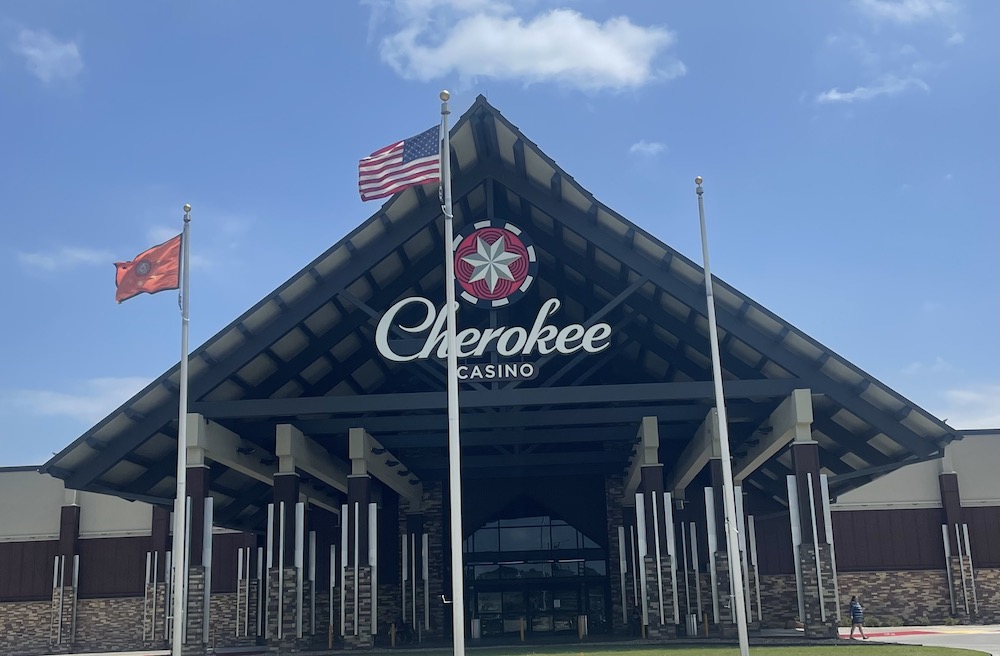
- Details
- By Levi Rickert
TAHLEQUAH, Okla. — In a move to display the prominence of tribal sovereignty, Cherokee Nation Principal Chief Chuck Hoskin, Jr. issued an executive order on Wednesday limiting the use of state of Oklahoma flags on the Cherokee Nation reservation.
The executive order notes that the Oklahoma flag "should not ordinarily be displayed" on Cherokee Nation property or at Cherokee Nation public events, but also outlines when the state flag can or should be displayed.
As leader of Indian Country’s largest tribe, Hoskin said it is time for the Cherokee Nation to show its strength and determination when it comes to tribal sovereignty. Hoskin is quick to clarify that Wednesday’s order is not the result of frayed feelings between the Cherokee Nation and the state of Oklahoma.
“The Cherokee Nation remains a close partner and ally of the state of Oklahoma, and the executive order is not intended to send any message to the contrary,” Hoskin said in a statement to Native News Online.
“The Cherokee Nation is a sovereign entity with jurisdiction over our reservation, and the use of the Cherokee Nation flag on our land should reflect the strength and determination of the Cherokee people over these 113 years,” Hoskin said.
The Oklahoma state flag remains in use at events involving Oklahoma government leadership or honoring visiting dignitaries and service in the Oklahoma National Guard.
The executive order reads:
The flag of the State of Oklahoma should not ordinarily be displayed on Cherokee Nation property or at Cherokee Nation public events. Provided:
- The flag of the State of Oklahoma may be displayed with approval from the Administration.
- Approval will ordinarily be given for the temporary display of the flag of the State of Oklahoma when a dignitary representing the state is present as a participant in the event as a demonstration of respect for the dignitary.
- The flag of the State of Oklahoma may be flown at all events, locations and facilities, in order to honor or commemorate service in the Oklahoma National Guard, at the direction of Administration or the Secretary of Veterans Affairs.
The executive order extends to properties owned by the Cherokee Nation, including the Hard Rock Cafe in Tulsa, Okla., and other casinos at various locations on the Cherokee Nation Reservation.
The executive order also calls for flags flown by the Cherokee Nation to be made on the reservation or domestically.
More Stories Like This
Oglala Sioux Tribe Rejects ICE Conditions for Information on Detained MembersSupreme Court Victory Secures Alaska Native Subsistence Fishing Rights
Three Kings Day Feast Honors Pueblo Self-Governance Rooted in Pre-Colonial Traditions
Navajo Council Committees Tackle Grazing Enforcement, Code Revisions
U.S. Must Fulfill Obligations by Protecting Programs
Help us defend tribal sovereignty.
At Native News Online, our mission is rooted in telling the stories that strengthen sovereignty and uplift Indigenous voices — not just at year’s end, but every single day.
Because of your generosity last year, we were able to keep our reporters on the ground in tribal communities, at national gatherings and in the halls of Congress — covering the issues that matter most to Indian Country: sovereignty, culture, education, health and economic opportunity.
That support sustained us through a tough year in 2025. Now, as we look to the year ahead, we need your help right now to ensure warrior journalism remains strong — reporting that defends tribal sovereignty, amplifies Native truth, and holds power accountable.
 The stakes couldn't be higher. Your support keeps Native voices heard, Native stories told and Native sovereignty defended.
The stakes couldn't be higher. Your support keeps Native voices heard, Native stories told and Native sovereignty defended.
Stand with Warrior Journalism today.
Levi Rickert (Potawatomi), Editor & Publisher

